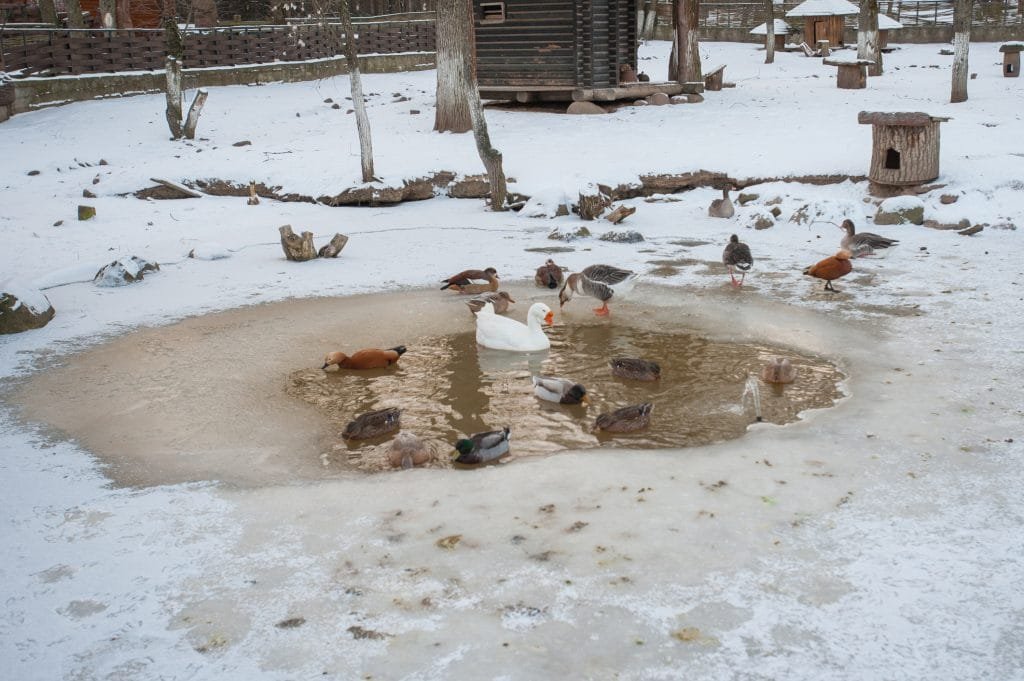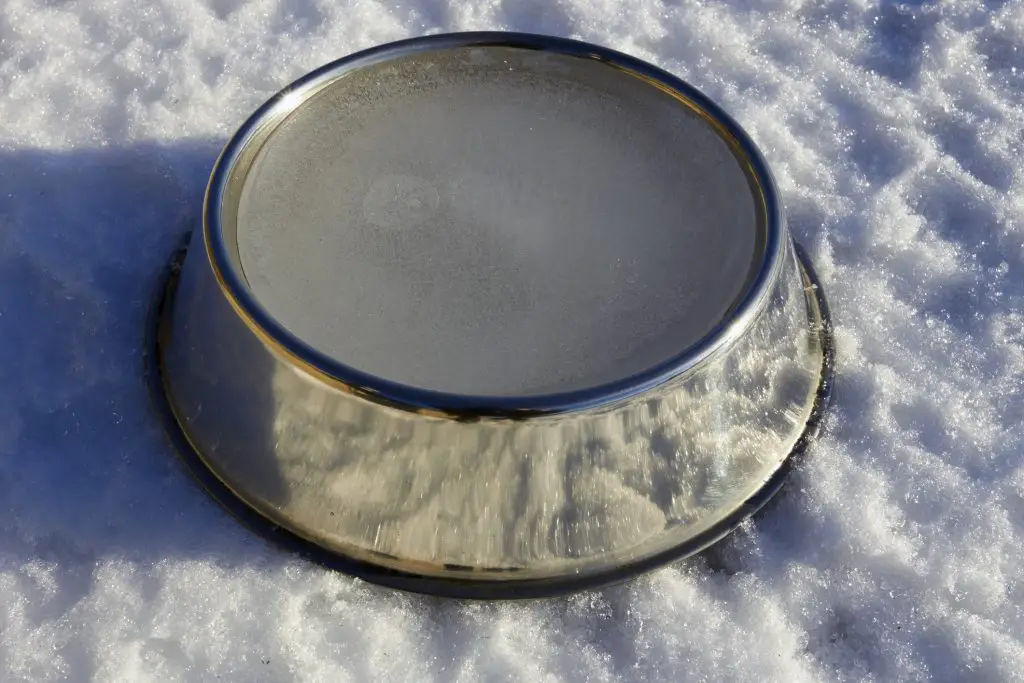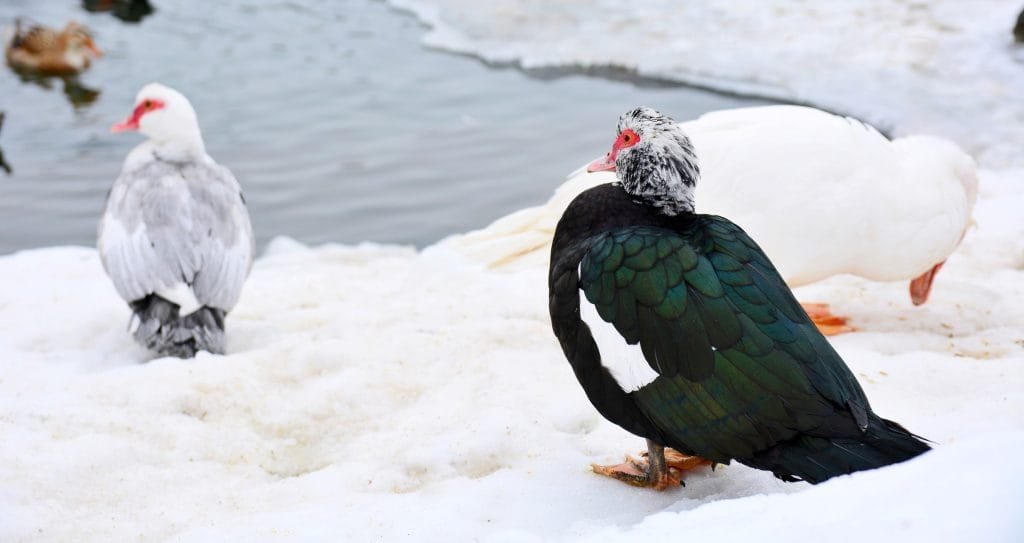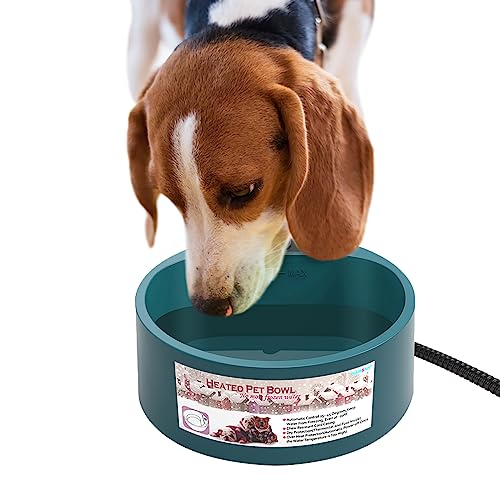This post contains affiliate links.
All duck species need to have constant access to freshwater to be happy and healthy. However, in the cold winter months, providing water for your ducks can be a challenging task. So, how can you water your ducks in winter?
Ducks need access to fresh unfrozen water in winter. To stop the duck’s water bowls and ponds from freezing you can install a water fountain, air pump, or purchase a water heater or heated water bowl. Other methods include insulating the water bowl or using floating objects to prevent ice from forming.
It is extremely important that your ducks have access to water to drink and swim in, even in the winter. Follow the simple methods below to ensure your ducks have the water they need without freezing.

How To Water Ducks In Winter?
One challenge you may face has to do with your duck’s water during cold weather. As we all know, you always need to provide your ducks with fresh, clean water. This goes for both drinking water and water for them to swim in. Ducks need water to help digest their food, learn more about this in my article, How Often to Feed Ducks.
So, in the winter, you still need to fill your duck’s water bowls and leave them in a location where your ducks can access them easily. You also still need to fill up their pools and ponds to ensure they have a safe space to swim throughout the winter.
If you only have a few ducks (about three or four) and you don’t want them to wander too far away from their shelter to go swimming in the winter, you can buy a plastic children’s pool and fill that up for your ducks to swim in.
However, in the cold winter months, where the temperature drops below 32° F (0° C), it can be a challenge for duck owners as the water you provide for your ducks may begin to freeze. This is something all northern duck owners will eventually have to face.
If the temperature outside your home does not drop below freezing, you will have no issues watering your ducks in the winter. But, if you regularly have temperatures below freezing, you will need to watch the water to ensure it does not freeze, as this could lead to your ducks suffering from dehydration.
A few methods you can use to ensure your ducks have water that does not freeze in the winter will depend on the enclosure you keep your ducks in. If the enclosure has an enclosed area, you can place their drinking water inside it, where the roof will help stop the water from freezing.
You can also build an insulating area just for the water bowl to help stop the water freezing, which I will go through later in this article. You need to ensure you check your ducks drinking and swimming water twice a day in the winter to ensure it’s still accessible to your ducks.
There are various methods to help you keep your duck’s water liquid; I will cover the most common and easiest methods below.

Ways To Stop Your Ducks Pond Or Drinking Water From Freezing
If you are worried about watering your ducks during the winter due to the water freezing, then there are methods you can choose from that can help prevent your duck’s water from freezing. There are multiple methods, so you are sure to find one that suits you and your duck’s habitat.
The Size And Type Of Your Ducks Water Source
Before I go into all the methods of stopping your duck’s water source from freezing, we need to go over the size of the water source. The size and type of your duck’s water source will determine what method you can use to stop the water from freezing successfully.
The larger the water source the less prone to freezing it will be. A small bowl of drinking water will freeze much faster than a larger pool. Also, a buried water source will take more time to freeze than one above ground.
For example, if your duck’s water source is a small above ground pool or “pond,” then you may be able to stop the water inside it from freezing by placing some straw or hay bales around the pool, ensuring you leave enough space for one duck to enter the pool at a time.
This will help insulate the pool from the cold and prevent it from freezing. However, this method will only help with a small pool, and it does also have limits on how well it can protect the water.
If you have a small plastic baby pool, livestock tank, or decorative garden pond that you are using as a pond for your ducks, then you could try and partially submerge it in the ground. The environment underground tends to be warmer in cold weather and could help insulate the pond.
You may need to combine the insulating methods mentioned above with one of the other prevention methods if the temperature drops below freezing in your area in the winter. However, the methods above will provide some protection for the water from the weather.
The Plastic Milk Jug Method
If you buy the 1-gallon (4 L) milk in the plastic jugs, then you can start saving these throughout the other seasons to help you prepare for the winter frost and frozen water, as these jugs can be extremely useful during this time.
When the cold winter months hit you, you can fill these 1-gallon plastic jugs with some tap water and normal table salt to a ratio of 2:1. Then you can place a few of these jugs into your duck’s small pond or pool.
As they bob around in the water, they will help prevent the surface of the water from freezing, allowing you ducks to have access to their water for swimming. You can also use this method for larger ponds, but you will need to do some modifications as they may not move around enough in the pond to stop the water from freezing.
For bigger ponds, you will need to tie the gallon jugs loosely in a row with a piece of rope and then place them in your pond.
When you place them in the pond, ensure the rope is at the top and the jugs are halfway in the water, then tie the ends of the rope to some trees on either side of the pond to keep the bottles in place.
This will allow the wind around the pond to move the plastic jugs around enough in the pond to help prevent the surface from freezing.
The Ping Pong Ball Method
The ping pong ball method is something you can use to help prevent your ducks drinking water from freezing in the winter. This method is similar to the milk jug method mentioned above but on a smaller scale.
You can either use ping pong balls for this method or a few small plastic water bottles that you don’t mind throwing away after winter, but this will be determined by the type of waterer you have for your ducks.
If your waterer for your ducks is open, for example, an open trough; then you will need to use the small water bottles. However, if you have a waterer with a lid and some fountain tips for your ducks to drink from, then you can use the ping pong balls.
If you are using the water bottles, you will need to fill them up with some tap water and mix in some table salt to create a saltwater mixture inside the bottles. A 2:1 ratio works well, 2 parts water to 1 part salt. You do this because salt water has a lower freezing temperature than freshwater, meaning the water in the bottles won’t freeze.
Salt water is better to use than another type of anti-freeze since it won’t be harmful to your ducks if a bottle leaks. But if you notice one of the water bottles has cracked or is leaking you should change the water right away and discard the broken bottle.
You can then place the bottles into your open waterer, which should help prevent the water from freezing. If you have a closed waterer and are going to use the ping pong balls, you will place some ping pong balls into the waterer and close the lid.
The ping pong balls will then float around in the water and move around when your ducks drink, which will help prevent it from freezing in the cold weather.
Running Water to Prevent Ponds and Bowls from Freezing
If you can, purchase and set up a fountain pump in your duck’s pond or water trough. It is a great way to help prevent the water from freezing in the winter. Having one of these will help keep the water moving enough so thick ice will not form.
You can power a fountain pump using a long extension cord, or you can opt for a solar-powered pump. You should also ensure you buy a fountain pump that can have its head positioned a bit above the water.
This will help stop the pump from getting clogged up by duck droppings or even algae that may develop in the water. A clogged pump will not effectively move the water around to prevent freezing and could end up burning the fountain, meaning you will need to buy a new one.
- 4-in-1 Integrated Nozzle: OKMEE solar powered fountain pump for bird bath is the only one...
- Different Water Style and Gentle Burbling Sound: 4 water styles, water up to 50-70cm jet...
- High Quality and New Technology: OKMEE pump with water-shortage protection and filtration...
Fountains are a great way to keep the water moving in other seasons too as this helps prevent the water from becoming stagnant and a mosquito breeding ground.
For a water bowl, you can buy a water fountain bowl. These are commonly found for cats and dogs but work very well for ducks too. The moving water will help stop the water from freezing. But if you have extremely cold weather then even these fountains might freeze too.
- 【3L Large Capacity】Ownpets 3L/102oz Pet drinking fountain is great for small to medium...
- 【Double Filter 】Our pet drinking fountain with replaceable filter can filter bad...
- 【Super Quiet Pet Fountain】With the super quiet pump, you can hardly hear the sound of...
Use an Air Bubbler to Prevent Water from Freezing
My go-to method for preventing my pond from freezing is an air bubbler. These are usually used to aerate the water in a fish tank or hydroponic set up but they work very well to stop a pond from freezing over.
The air pump is connected to an air hose and air stone. The stone lets little bubbles out of it to keep the water moving. This stops ice from taking hold on the top of the pond or water dish.
I like that even in extremely cold temperatures the air bubbler will continue working as there is no water inside the pump to freeze and break it. Although the water of the pond or dish may still freeze in spite of the moving water.
Another advantage to an air bubbler is the air pump can be placed outside of the ducks pen and can power multiple air hoses. So one pump can be used in multiple bowls, dishes or ponds. There are also many different sizes of air stones.
If the water drops below the air stone there is no damage like with a normal water pump since the air pump does not have an intake that is affected by the water level.
- A COMBO - Comes with a 1 x 32W air pump, 2 x air stones, and 1 x 25ft-long airline; The...
- GREAT OUTPUT PUMP - Powerful electromagnetic motor pushes 950 gallons per hour to deliver...
- STURDY CONSTRUCTION - The electromagnetic air compressor in a high-quality aluminum alloy...
Use a Heated Bowl or Water Heater
A heater water bowl or small water heater is another great way to prevent your duck’s drinking water or duck pond from freezing.
The heated bowl should be able to keep the water inside from freezing if you place the bowl under some shelter. These bowls are generally deep enough for your ducks to drink from or even dip their heads into.
A heated bowl is also useful if all other water is frozen as this will allow your ducks to have access to a bit of water they can wet their feathers with, even though it’s not as good as a proper bathe for them.
- NAMSAN focus on researching pet supplies, this heated pet bowl is authorized by Namsan,...
- The thermostat is sealed inside the bowl, keep the water temperature between 77-95℉, but...
- 5.5 feet power line, steel wrapped, chew-resistant, safety for pets water drinking, can...
For larger bodies of water like ponds, I recommend getting a bucket heater. These are stainless steel electric heaters that will keep your pond warm. Some even have a temperature setting on them so your ducks won’t be taking a warm bath. You will want to place the heater in a spot that the ducks cannot reach. The heater could burn the ducks if they touched it.
However, I don’t recommend using a fish tank heater. These are usually made of glass (sometimes plastic) and you run the risk of them breaking. If a glass heater breaks, you run the risk of your ducks ingesting glass shards which could be fatal. Also, these heaters are designed to operate at ambient temperatures so they may not be very efficient.
- Fully submersible in fresh water, salt water, solutions
- Built in thermostat up to more than the boiling point of water
- Auto Shut-Off to prevent the liquid from overheating
The Floating Food Method
The floating food method will only keep your duck’s water from forming ice on the surface when the temperature reaches close to freezing, but it will not work if you are suffering from freezing temperatures.
This is an entertaining method as it will have your ducks on the water chasing some food around as it bobs about on the surface of the water. For this method, you can place a head of lettuce, cabbage, or any other similar healthy snack that your ducks love and that will float into the pond or waterer.
When your ducks swim after the food, this will cause the food to bob around and move around the water’s surface, preventing it from freezing.
Not only will this help prevent the surface of your duck’s water from freezing, but it is also a great way to amuse your ducks too. Duck’s need entertainment as they are smart animals, which will do the trick for a few hours every day.
Learn more about what ducks should eat during the winter in my article, What To Feed Ducks In The Winter?
Add Some Boiling Water
Something that many duck owners will do to help prevent their duck’s water from freezing in the winter is to boil some water in their kitchen and add the hot water into the water outside for their ducks.
This will only be a viable method for people who have two or three ducks that do not require a lot of water; otherwise, you will be boiling water and adding it to your duck’s waterer or swimming area all day long which no one has time for.
This will only work if you have freezing temperatures for a short while or if the temperature goes below freezing at night but then climbs back above freezing during the day. If you constantly have freezing temperatures, you will not be able to keep up with how fast the boiled water will cool down and freeze.

Insulate Your Duck’s Water Bowl
Another option you have to prevent your ducks drinking water from freezing is by insulating the water bowl. You can purchase an insulate bowl or DIY. For the DIY version, buy or find a used tire that the water bowl will fit inside of and that your ducks can reach inside of.
Then you fill the tire with some plastic, either plastic bags, or squashed plastic water bottles to create some insulation.
Place the tire on the floor and place a piece of wood inside it where the water bowl will stand. Place your duck’s water bowl on top of the wood inside the tire. This will help insulate the water in the bowl and prevent it from freezing. You should combine this with one of the other methods above for the best results.
Final Thoughts
In winter, watering your ducks can be a nightmare for some duck owners, but it doesn’t have to be for you. You can use many methods to help your duck’s water stay in liquid form. They need to have enough water so they do not suffer from dehydration in the cold winter months.
Most of these methods are easy to do and are not expensive as you can use objects you likely already have around your home. Many products can be easily found from Amazon, your local feed store, or even used.





